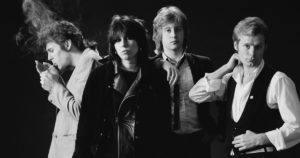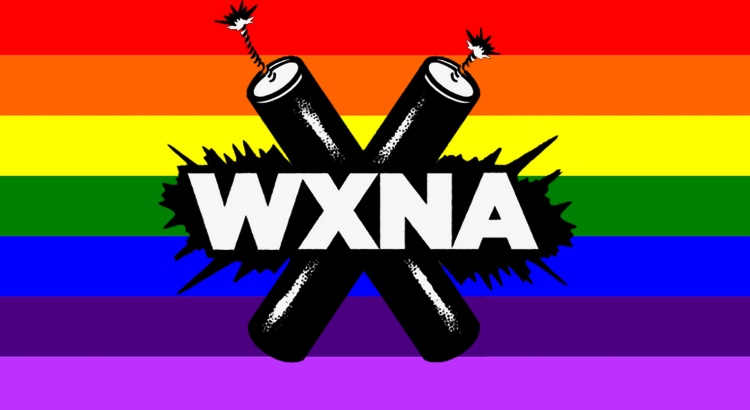Being a gay man and deejay on WXNA (Slings & Arrows, Tuesdays noon to 2), and it being the month of June, I was asked by the station manager if I would consider writing a blog for Pride. My first thought was, Why not? I like to think I might have something to say on the matter. But then my mind went blank. So, it was suggested I might want to discuss music that affected me as a closeted youth and the powerful pull music can have to open hearts and minds, to be a solace or a catalyst.
Well, after wracking my brain, I couldn’t think of any music that spoke to me as a youth on that level. Of course, music enters the soul in ways unknowing, and surely the inner self hiding within was listening to the music that passed my ears in a way differently from the outer self. Dancing queens like ABBA and Donna Summer, or the witchy swirl of Stevie Nicks, were scratching an inner itch, and music my brothers brought into the house—The Rolling Stones, Tom Petty and the Heartbreakers, The Pretenders—scratching an outer.
 I remember my 12-year-old self hearing Pretenders I for the first time in my brother’s room. He brought it home, excited to listen, as a friend of his had suggested he get it. When that first song came on with its driving drums and thrashing guitars, I was hooked. But it was Chrissie Hynde’s vocal attitude that sealed the deal. Her incisive intensity scared the bejesus out of me, and I loved it.
I remember my 12-year-old self hearing Pretenders I for the first time in my brother’s room. He brought it home, excited to listen, as a friend of his had suggested he get it. When that first song came on with its driving drums and thrashing guitars, I was hooked. But it was Chrissie Hynde’s vocal attitude that sealed the deal. Her incisive intensity scared the bejesus out of me, and I loved it.
When she sang, “but not me baby, I’m too precious, fuck off,” I was (1) blown away by the fact that such language could be said on a record, and (2) excited that it was a woman who would say it. It was my first “fuck” in music. The lacey frills of Stevie Nicks twirled away. I wanted the staunch leather of this badass woman to reach into places I didn’t yet know existed. On that album I discovered the essence of the preciousness within (a resource not to be wasted) and the rowdy and lawless swagger without. Selves coalesced.
Of course, time moves on, and Tom Petty’s drawl prevails over Hynde’s as I get older. One can’t change the vicissitudes of time. Just like one can’t change the crucial way music makes you feel when you’re young and alone and scared and hiding within yourself. When you feel that the world rejects you.
The music on the jukebox at the Stonewall Inn must have had that kind of powerful effect. It was stacked with the songs of its time, 1969, a year of revolution. (In 1969 it was illegal for gay people to congregate and drink—let alone dance—together. The Stonewall Inn was a place where they could do all three.) Witnesses claim that shortly before that historical raid, “(I Can’t Get No) Satisfaction” was played. It has also been noted that one of the favorite songs to dance and sing along with on the Stonewall Inn jukebox was “Aquarius (Let The Sunshine In)’ by The 5th Dimension. Clearly, it is a song about transcendence:
Harmony and understanding
Sympathy and trust abounding
No more falsehoods or derisions
Golden living dreams of visions
Mystic crystal revelation
And the mind’s true liberation
The word “liberation” must have struck a chord and reverberated in the hearts of the young queer men and women and transgender individuals who frequented there. Along with “This Is My Life (La Vita)” by Shirley Bassey, with its refrain of “let me live, let me live,” and others, these songs must have forged feelings of rebellion, independence, and hope.
So, when the cops came (with little backup at first, it must be noted) in the post-midnight hours on that hot New York City night, something burst. Liberation enflamed the dark. Love steered the stars. And here we are, a people on a road to vindication. Pride.
Michael Roark
Slings and Arrows
Tuesdays, noon-2pm


